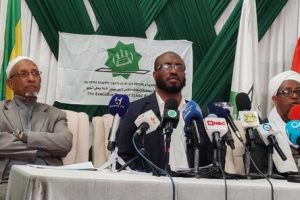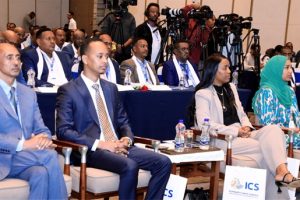Despite its efficacy in accommodating ethnic diversity, Ethiopia’s multinational federalism has been marred by ethnic tensions and conflicts resulting grave ramifications. As a result, the issue of multinational federalism has been at the center of heated debate for long, garnering the attention of politicians and scholars.
While some attribute the ethnic tensions to failure in the implementation process, some others point finger on the type of federalism Ethiopia adopted in 1995. As the conflictsintensify,so doesthe debate.
Prof. Beyene Petros is a well known figure in Ethiopian political landscape and he is President of Ethiopian Social Democratic Party.
He argued that there are ways that identity politics can be a source of ethnic conflict by its nature but the existing conflicts witnessed in the country are a result of a quest for resource, misinterpretation of ethnicity and ethnic federalism but mainly consequence of maladministration.
“It is obvious that ethnic groups’ rights couldn’t be ignored even by proponent of citizenship politics he added. But there must be balance between identity politics and citizen one, ” he said. “Some politicians may try to achieve their narrowly defined individual interests out of ethnic conflicts,” he noted adding that “ethnic conflicts appear to result collateral damage.”
In relation with addressing regional states’ disagreements over borders, he noted, the government should take amendment on the qualification to line boundary,” he said.
The existing regional states have been crafted based on linguistic and ethnic demography (based on the majorities’ language, fifty plus) of residents. Accordingly, it needs to be amended after conducting of mutual agreement on the qualification.
Another long serving politician and popular opposition figure, who is President of Oromo Federalist Congress Prof. Merera Gudina told The Ethiopian Herald that identity politics has emerged due to unjust political administration of the past with multinational federalism becoming the best alternative of politicians to accommodate all ethnic groups.
“Identity politics or multinational federalism by its nature is not a means to erode national identity, it is rather how we implement that would be endangering national unity.” He adds “nevertheless, EPDRF government was not able to accommodate all nations and nationalities’ right in the past decades.
I think the current dispute among ethnic groups is ascribable to this failure.” Politics by its nature is dong the possible one and skipping the unfeasible, he stressed. Accordingly, the government must take action on controversial issues and other stakeholders especially political parties should be refrained from making hate speeches.
In relation to the issue of border and identity Prof. Merera also underscored the demographic structure of Ethiopia as complex and the governing state should take a possible measurement in consultation with the people.
Belete Molla, Vice Chair and election affairs of National Movement of Amhara, a recently established political party for his part said multinational federalism is a product of ethnic based violence. To Molla, the existing ethnic based conflicts could be resolved by setting mutual agreement of all states.
Representative of ethnic groups who live out of their initial destination also should be represented in accordance with their quota, he insisted. “For instance large number of Amhara people live outside of Amhara state.
But they don’t have representatives. Multinational federalism does not mean that drawing regional administrative boundary only , it needs to represent each ethnic groups living in particular states.”
The Ethiopian Herald April 19, 2019
BY YESUF ENDRIS





